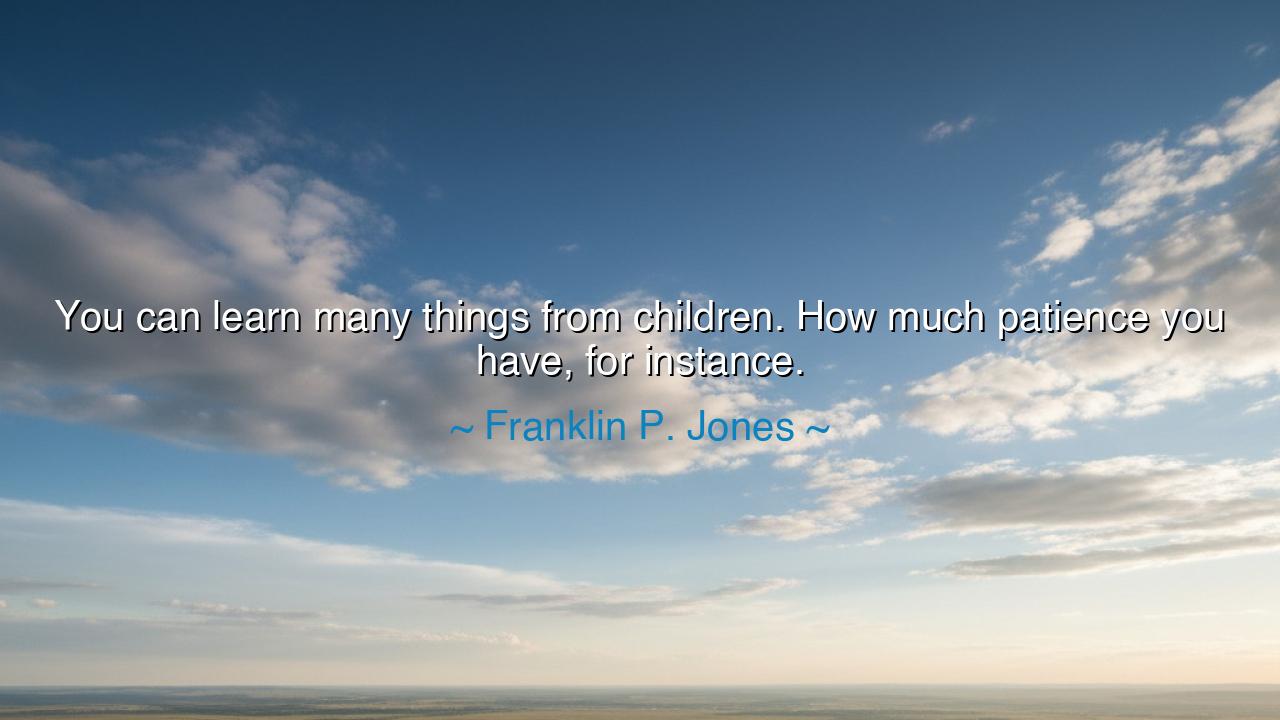
You can learn many things from children. How much patience you






The words of Franklin P. Jones, humorist and observer of human life, carry within them a truth both simple and profound: “You can learn many things from children. How much patience you have, for instance.” Though spoken with a touch of wit, this statement reveals a wisdom that cuts deep. It tells us that children, though young and unformed, are teachers in their own right. They hold a mirror to the hearts of adults, testing not only their patience, but also their capacity for love, endurance, and humility.
The meaning begins with the recognition that children are not yet governed by the constraints of order, time, or decorum. Their questions are endless, their curiosity unbounded, and their energy tireless. In their innocence they challenge adults, who are often bound by schedules and expectations. To walk with a child is to be pulled into a world where delays are constant, where chaos is common, and where one’s limits of patience are stretched again and again. Thus, in the presence of children, one discovers not merely what one teaches them, but what they reveal about oneself.
The origin of such wisdom lies in the timeless experience of parenthood and mentorship. Since the earliest days of humanity, the raising of children has been both the greatest joy and the greatest trial. Their laughter uplifts, yet their tantrums test the spirit. Their innocence inspires, yet their stubbornness pushes the boundaries of endurance. Franklin P. Jones captures this paradox: that in guiding children, adults are also being guided — tested and refined in the fires of daily interactions.
History offers us countless mirrors of this truth. Consider Mahatma Gandhi, who often said that the true measure of a person’s strength lay not in power but in restraint. Gandhi, though not speaking directly of children, lived a life where patience was tested constantly — by his followers, his critics, and his adversaries. In the same way, parents and teachers learn patience not in moments of calm, but in the small trials presented by children, whose demands for attention and understanding are relentless. These trials, though exhausting, shape virtues as surely as hardship shapes courage.
There is also the example of Abigail Adams, wife of John Adams and mother of future president John Quincy Adams. In her letters, she spoke often of the challenges of raising children while her husband was away on political duty. She confessed that her patience was tested daily, yet it was through this constant testing that she grew stronger, more resilient, and more capable of raising leaders. The trials of her children became the forge of her own character, proving Jones’s words true.
The lesson for us is clear: to engage with children is to engage with a mirror of our own souls. They do not merely learn from us; they draw out of us our hidden strengths and weaknesses. Our patience is revealed in the slow pace of their steps, in the endless repetition of their questions, in the stubbornness of their wills. To endure these moments with grace is to cultivate virtues that extend far beyond the nursery or the classroom.
Practical actions emerge from this teaching. When dealing with children — whether our own or others — let us see the testing of patience not as a burden, but as a gift. Take a breath before reacting. Listen with intent, even when weary. Embrace the opportunity to grow in endurance and compassion, knowing that these qualities will serve us in every area of life. And remember always that children, though they may test us, are also shaping us into wiser, calmer, more understanding beings.
Thus, let the words of Franklin P. Jones endure as a gentle but profound reminder: children are teachers of patience. Their very presence calls forth the virtues we claim to hold, proving whether they are real or merely imagined. If we embrace this test with humility, we will find ourselves not only raising the next generation, but also being raised ourselves — into greater wisdom, compassion, and strength.






AAdministratorAdministrator
Welcome, honored guests. Please leave a comment, we will respond soon